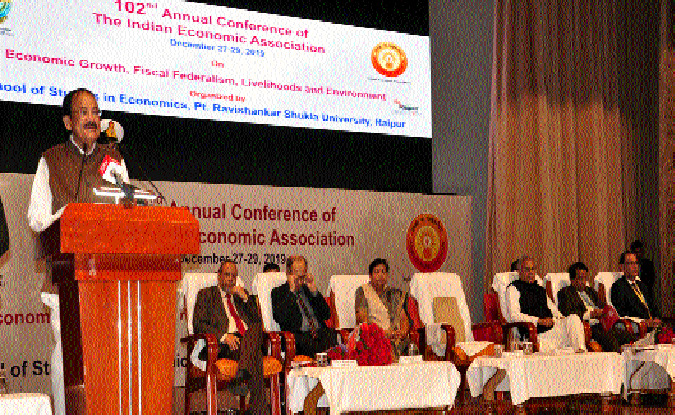Economy will rebound in near future: V-P
| Date :28-Dec-2019 |

Terming the current economic slowdown as cyclic, Vice President M Venkaiah Naidu expressed confidence that the economy will rebound in the near future. Cautioning modern day politicians against waivers and calls for diversifying rural economy, the Vice President said the centre has launched various reforms aimed at making the economy more robust and resilient.
Vice President M Venkaiah Naidu expressed these views while inaugurating the 102nd Annual Conference of the Indian Economic Association at Pandit Deendayal Upadhyaya Auditorium, Science College Ground in the capital, emphasizing focus on economic growth, fiscal federalism, livelihoods and environment. Governor Anusuiya Uikey, Chief Minister Bhupesh Baghel, President of International Economic Association Professor Kaushik Basu and Professor Mahendra Dev, President of International Economic Association, Dr G Viswanathan and Vice Chancellor of Pandit Ravi Shankar University Kesari Lal Verma graced the occasion by their presence.
The 102nd Annual Conference of the Indian Economic Association is being hosted in the capital by School of Studies in Economics, Pt Ravishankar Shukla University, Raipur, burning issues like Trends and Prospects of Faster and Sustainable Economic Growth, Agricultural Economy, Industrial Economy, Poverty and Unemployment in Chhattisgarh and Current Development and Welfare Programmes will come up for discussions.
Addressing the inaugural session of the Conference, the Vice President cautioned modern day politicians against waivers and calls for diversifying rural economy. He said modern day politicians should understand that if they want to have a welfare state and want to distribute wealth, there is need to create wealth first. He said there are many sectors which require serious attention like poverty eradication, education etc. The Prime Minister has given advice of reform, perform and transform. Transformation of the nation, not only wealth creation but to make peoples’ life more comfortable, he said.
The Vice President said it was true that the Indian economy was facing some challenges due to the decline in growth this fiscal. However, he said the country had faced similar slumps in the past in the wake of the East Asian financial crisis and global slowdown but bounced back with a higher growth rate every time. Referring to the reforms initiated by the government including demonetization, the introduction of the revolutionary GST to usher One Nation, One Tax, One Market, the Insolvency and Bankruptcy Code and the steps taken to curb black money, the Vice President asserted that they were aimed at making the economy more robust and more resilient.
Notwithstanding the GDP figures, India remains one the fastest growing bigger economies of the world. ‘I must caution that a figure by itself may not always reveal the real story and strength of the economy unless it is placed in the context of recent policy initiatives, legislative architecture and institutional framework’, said the Vice President. Pointing out that 66 lakh new taxpayers have been registered under the GST regime since its launch, the Vice President said that it indicated the rising trend of formalization of the economy. The Government has also taken measures to tackle the problem of NPAs and improve the health of the banking sector, he added.
As a nation, we have taken a resolve to make our economy a US $ 5 Trillion economy by 2025, double the income of farmers by 2022, provide affordable Housing to all and connect every household with 24 hour power supply and piped drinking water by 2022, when we celebrate 75 years of our independence. These are ambitious targets, but these services should have been delivered to our people in these 75 years. These targets will need resolute policy action, technology intervention and entrepreneurship and financial resources.
Observing that agriculture was the mainstay of Indian economy, the Vice President cautioned that various waivers and subsidies would be unsustainable in the longer run. Stressing the need to diversify the rural economy, he said “rural non-farm activities are equally crucial for the growth of the rural economy”.
Stating that it was our national resolve to double the farmers’ income by 2022, Naidu called for making rural economy sustainable and remunerative. The Vice President also stressed the need for agricultural products to have access to larger markets, strengthening rural infrastructure, storage, and supply chains, apart from promoting village level in-situ food processing industry.
Referring to fiscal federalism as one of the themes of the conference, Naidu said while most of the states have retained their fiscal deficit around permissible 3 percent, it has come at the cost of low capital expenditure. There has been a rise in committed liabilities towards payment of interest and pensions, thereby leaving only a small part of their budget for capital expenditure on infrastructure development, he added.